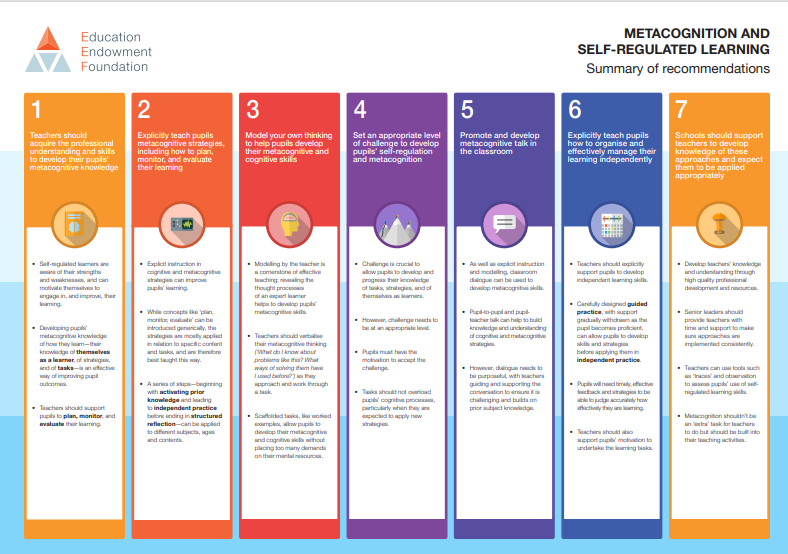Metacognition and self-regulation - high impact, low cost

“Self-regulated learners are aware of their strengths and weaknesses, and can motivate themselves to engage in, and improve, their learning”
Since as far back as 2011, the EEF has reported on the positive and value for money impact of metacognitive approaches on pupil learning in its Teaching and Learning Toolkit. More recently, it has been identified as one of the four core elements in Essex Local Authority's “Addressing Educational Disadvantage” Strategy (Addressing Educational Disadvantage in Schools and Colleges: the Essex Way, Ed. Marc Rowland, John Catt 2021).
In this Spotlight, we explore the guidance available from the Education Endowment Foundation to support schools in developing metacognition at the core of practice, including some often overlooked tools and resources.
In its recently updated Teaching and Learning Toolkit, metacognition is described as very high impact for very little cost, based on extensive evidence.

But what does it look like in practice?
The EEF Guidance Report Metacognition and Self-Regulated Learning was first published in 2018 - you can read it here.
“This guidance report reviews the best available research to offer teachers and senior leaders practical advice on how to develop their pupils’ metacognitive skills and knowledge. The report has recommendations in seven areas and ‘myth busts’ common misconceptions teachers have about metacognition. For example, some teachers think they need to teach metacognitive approaches in ‘learning to learn’ or ‘thinking skills’ sessions. But the report warns that metacognitive strategies should be taught in conjunction with specific subject content as pupils find it hard to transfer these generic tips to specific tasks.”
As with most EEF Guidance Reports, it translates the review of research into a manageable number of key recommendations which are also presented in poster form.

The seven recommendations, each expanded in its own section of the guidance, are:
- Teachers should acquire the professional understanding and skills to develop their pupils’ metacognitive knowledge
- Explicitly teach pupils metacognitive strategies, including how to plan, monitor, and evaluate their learning
- Model your own thinking to help pupils develop their metacognitive and cognitive skills
- Set an appropriate level of challenge to develop pupils’ self-regulation and metacognition
- Promote and develop metacognitive talk in the classroom
- Explicitly teach pupils how to organise, and effectively manage, their learning independently
- Schools should support teachers to develop their knowledge of these approaches and expect them to be applied appropriately
The Guidance Report is becoming more well known in schools, but what is more often overlooked are the support tools that accompany it on the EEF website.
The first of these is the Whole School Audit Tool, which can be used as part of an initial audit process to establish current practice, as well as in monitoring progress towards the development of more effective practice. It provides descriptors of Ineffective, Improving and Exemplary practice including those relating to teacher practice and associated pupil behaviours.
The second is a summary and activity based on the Four Levels of Metacognitive Learner (Perkins, 1992):
- Tacit
- Aware
- Strategic
- Reflective
This supports schools to identify the learning behaviours associated with each, and to establish those which are most characteristic of pupils who have well developed metacognitive skills.
The third supports schools in considering metacognition and self-regulation in the Early Years. It is a teacher assessment tool for independent learning behaviours, drawn from ‘Developing Independent Learning in Children Aged 3 – 5’, Anderson, Coltman, Page & Whitebread – University of Cambridge.
These tools can be downloaded by following the Metacognition and Self-regulated Learning link on the Guidance Reports home page, and scrolling down to the bottom of the page.
Link: Metacognition and Self-regulated Learning | EEF
There are of course synergies with the 2021 Teacher Feedback to Improve Pupil Learning EEF Guidance Report which was the subject of our 24/11/21 Spotlight, as it is through feedback that teachers scaffold for pupils information about their own learning, and strategies for improvement which increasingly move them towards independent self-regulation.
Read our other Spotlight on Evidence articles here.
